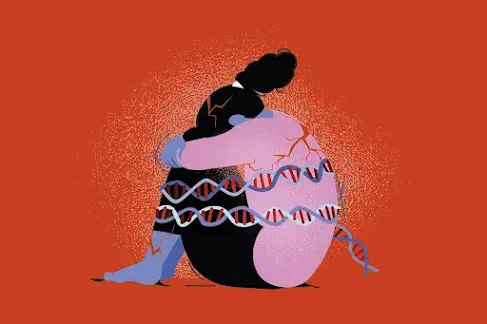The Impact of Genetics on Mental Health
Mathematical health conditions exist
as global public health challenges by altering psychiatric states as well as
behavioral responses and life quality measurements. Research shows that genetic
factors stand out as equally important as environmental elements such as trauma
and lifestyle alongside stress. Scientific knowledge about mental health
genetics enables enhanced strategies for disease recognition and medicine
development and prevention planning.
The Role of
Genetics in Mental Health Disorders
The genetic predisposition to mental
health conditions proves to be a substantial factor in determining the risk of
developing these conditions. Various research on twins and family members
demonstrates that numerous psychiatric disorders including depression,
schizophrenia, bipolar disorder and anxiety display genetic inheritance
patterns. For example:
·
Schizophrenia: Scientific research indicates genetics lead
to 70-80% of the susceptibility to develop the condition. The risk for
schizophrenia develops at 10% higher levels in individuals who have parents or
siblings diagnosed with schizophrenia compared to average population
statistics.
·
Bipolar
Disorder: Genetic elements account for between
60% to 85% of the danger exposure. The risk of bipolar disorder developing in a
child becomes higher at 10-25% when a parent carries the disorder.
·
Major
Depressive Disorder (MDD): Genetics
contribute to 30-40% of schizophrenia development risk based on heritability
analyses while environmental triggers play a simultaneous but lesser role.
·
Autism
Spectrum Disorder (ASD): The risk
factor for schizophrenia stems from genetic influences between 50% to 90% while
hundreds of specific genes contribute to the condition.
How Genes
Influence Mental Health
The structure and function of the
brain as well as brain chemistry become influenced by genes which determine
mental health outcomes. Key mechanisms include:
1.
Neurotransmitter Regulation
The production and breakdown of
neurotransmitters serotonin and dopamine and glutamate are controlled through
genetic mechanisms because these chemicals regulate mood and cognition. Genetic
variations of SLC6A4 together with other gene variations boost vulnerability to
depression and anxiety.
2. Brain
Development and Plasticity
Genes determine the development
process of the brain as well as its ability to adapt. Research has established
a connection between schizophrenia and ADHD along with the COMT gene mutations
that control dopamine breakdown.
3. Stress
Response
The stress response mechanism of the
body depends on FKBP5 genes because they control cortisol production. Genetic
abnormalities produce PTSD and depression susceptibility in people who
experience traumatic events.
Gene-Environment
Interactions
Genetics elevate the likelihood of
mental disorders though they do not represent certain diagnoses. Multiple
environmental elements work together with genetic materials to start and
intensify medical conditions. For example:
·
Genetic
vulnerability to depression becomes manifest only after someone experiences
critical stress or traumatic events.
·
The activation of
stress-related genes during childhood abuse enhances the future risk for both
anxiety and mood disorders in adulthood.
The connection between genes and
environmental elements known as gene-environment interplay demonstrates why
genetic risks do not always result in mental health conditions.
Implications for
Treatment and Prevention
Extensive knowledge about genetic
influences represents a breakthrough opportunity for mental health care
development.
1. Personalized
Medicine
Through genetic testing physicians may
determine which individuals face higher vulnerability to develop such
conditions so they can receive prompt medical attention. Medical researchers
examine the drug response relationship between genes which leads to improved
medication selection strategies while eliminating unnecessary drug
experimentation.
2. Targeted
Therapies
Studying genetic markers might create
new medication options which treat biochemical disorders such as schizophrenia
and bipolar disorder specifically.
3. Reducing
Stigma
By recognizing that mental disorders
have biological origins healthcare professionals make it possible to decrease
stigma because these conditions result from natural mechanisms which run deeper
than personal weakness.
Challenges and
Ethical Considerations
Despite progress, challenges remain:
·
Complexity
of Genetic Influence: Multiple genes
play a role in mental health disorders which makes it challenging to identify
their precise causes.
·
Privacy
Concerns: The use of genetic testing generates
ethical problems about data protection alongside the risk of discriminatory
practices.
·
Limited
Predictive Power: Genetic testing
results alone cannot guarantee that a person will develop a mental disorder
since the presence of genetic risk does not equate to certain disease
development. Therefore, excessive focus on genetic testing might generate
unwarranted anxiety.
Conclusion
Genetics proves fundamental to mental
health development because it determines which disorders appear through
chemical brain functions and developmental phases alongside stress responses. Genes
do not independently create mental illness since environmental factors and
lifestyle elements play equal roles in its development process. Despite the path
forward created by genetic research for individual treatment plans and
anticipatory medical diagnosis serious ethical and operational issues persist. Mental
health genetic research strengthens the delivery of healthcare services to
patients with mental health disorders.




Post a Comment
0Comments